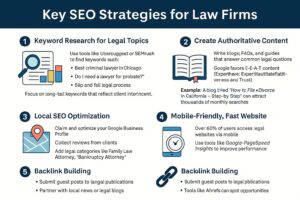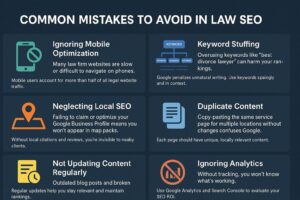In today’s digital-first world, having a solid online presence is not optional—it’s essential. And for law firms, where credibility, visibility, and authority matter more than ever, Search Engine Optimization (SEO) is a game-changer.
Whether you’re a solo attorney or a full-fledged law firm, implementing the right SEO strategy can help you attract more clients, appear in relevant searches, and stand out in an increasingly crowded legal marketplace.
This blog explores the role of SEO in the legal industry, how to strategize it effectively, and what tools can help your law firm rise in the rankings.
Why SEO Matters in Law
- 93% of online experiences begin with a search engine (BrightEdge)
- 75% of users never scroll past the first page of search results (HubSpot)
- 46% of all Google searches are local, which is critical for law firms that serve a specific city or region (GoGulf)
Legal clients today search for attorneys like they search for restaurants or services: online. From “divorce lawyer in Austin” to “how to file a personal injury claim,” potential clients rely on Google to guide their choices.
Without SEO, even the best legal expertise can get buried online.
Benefits of SEO for Law Firms
- Higher Visibility: Appear on Google’s first page for searches related to your services.
- Increased Credibility: High-ranking sites are perceived as more trustworthy.
- Better Local Reach: Local SEO helps target clients in your geographical area.
- Lead Generation: SEO-optimized content drives inbound traffic and high-intent inquiries.
- Cost-Effective Marketing: SEO continues to drive results long after content is published, unlike ads that stop when you stop paying.
Key SEO Strategies for Law Firms
1. Keyword Research for Legal Topics
- Use tools like Ubersuggest or SEMrush to find keywords like:
- “Best criminal lawyer in Chicago”
- “Do I need a lawyer for probate?”
- “Slip and fall legal process”
- Focus on long-tail keywords that reflect client intent.
2. Create Authoritative Content
- Write blogs, FAQs, and guides that answer common legal questions.
- Google favors E-E-A-T content (Experience, Expertise, Authoritativeness, and Trust).
- Example: A blog titled “How to File for Divorce in California – Step-by-Step” can attract thousands of monthly searches.
3. Local SEO Optimization
- Claim and optimize your Google Business Profile.
- Collect reviews from clients.
- Add legal categories like “Family Law Attorney” and “Bankruptcy Attorney.”
4. Mobile-Friendly, Fast Website
- Over 60% of users access legal websites via mobile.
- Use tools like Google PageSpeed Insights to improve performance.
5. Backlink Building
- Submit guest posts to legal publications.
- Partner with local news or legal blogs.
- Tools like Ahrefs can track backlinks and spot opportunities.

Top SEO Tools for Law Firms: Pros, Cons & How to Use
1. SEMrush
- Use for: Keyword research, site audit, competitor tracking
- Pros: Comprehensive; excellent reporting
- Cons: Expensive for solo lawyers ($119.95+/mo)
- How to Use: Track keyword rankings for terms like “personal injury lawyer NY” and monitor competitors’ top-performing pages.
2. Ahrefs
- Use for: Backlink analysis, competitor keyword tracking
- Pros: Best in backlink data; intuitive UI
- Cons: No free plan; steep learning curve
- How to Use: Identify who’s linking to your competitors, and reach out for guest post opportunities.
3. Google Search Console (Free)
- Use for: Monitoring site performance on Google
- Pros: Free and direct from Google; shows keyword impressions
- Cons: Limited suggestions for improvements
- How to Use: Track which legal keywords bring you the most clicks.
4. Moz Local
- Use for: Managing business listings & local SEO
- Pros: Excellent for law firms with multiple locations
- Cons: Limited backlink tools
- How to Use: Ensure NAP (Name, Address, Phone) consistency across directories.
5. Yoast SEO (for WordPress)
- Use for: On-page optimization of blog posts & pages
- Pros: Easy to use; traffic light-style SEO grading
- Cons: Some features are paid-only
- How to Use: Get real-time content suggestions while writing law-related articles.
6. Ubersuggest (by Neil Patel)
- Use for: Keyword research, site audit
- Pros: Affordable for beginners; simple UI
- Cons: Limited deep-dive features
- How to Use: Enter “child custody lawyer” and find keyword difficulty and volume to plan your content.
Examples of SEO-Successful Law Firms
- Morgan & Morgan – Uses blog content, video SEO, and PPC in sync.
- Nolo.com – Ranks high for generic legal terms and FAQs.
- Law Offices of Bryan Fagan (Texas) – Dominates local search through consistent blogging and keyword targeting.
Common Mistakes to Avoid in Law SEO
- Ignoring Mobile Optimization
- Many law firm websites are slow or difficult to navigate on phones.
- Mobile users account for more than half of all legal website traffic.
- Keyword Stuffing
- Overusing keywords like “best divorce lawyer” can harm your rankings.
- Google penalizes unnatural writing. Use keywords sparingly and in context.
- Neglecting Local SEO
- Failing to claim or optimize your Google Business Profile means you won’t appear in map packs.
- Without local citations and reviews, you’re invisible to nearby clients.
- Duplicate Content
- Copy-pasting the same service page for multiple locations without changes confuses Google.
- Each page should have unique, locally relevant content.
- Not Updating Content Regularly
- Outdated blog posts and broken links signal low quality.
- Regular updates help you stay relevant and maintain rankings.
- Ignoring Analytics
- Without tracking, you won’t know what’s working.
- Use Google Analytics and Search Console to evaluate your SEO ROI.

How SEO Specifically Benefits Law Firms
- Builds Authority & Trust
- Publishing informative, well-written content positions your firm as a knowledgeable leader.
- When potential clients see your answers on page one of Google, you earn trust before they ever contact you.
- Drives Qualified Leads
- SEO targets people already searching for legal help, not cold leads.
- High-intent keywords like “workers’ compensation lawyer near me” attract ready-to-convert users.
- Level the Playing Field
- Solo or small firms can compete with big-name firms through niche SEO targeting and smart content.
- Local optimization allows small firms to dominate specific geographies.
- Improves Client Experience
- Fast, optimized websites lead to better navigation and easier appointment booking.
- Informative content helps clients make informed decisions.
- Reduces Advertising Costs
- Once your content ranks, you don’t have to keep paying for traffic like you do with ads.
- Over time, organic traffic can drive more ROI than PPC.
Helpful Statistics to Support SEO in Law
- 74% of consumers visit a law firm’s website to take action (Google Consumer Insights)
- Over 96% of people seeking legal advice use a search engine (National Law Review)
- 70% of law firms report that SEO is their highest ROI marketing channel (Clio Legal Trends Report)
Sources:
- https://www.brightedge.com/resources/webinars/seo-statistics
- https://www.natlawreview.com/article/how-law-firms-can-leverage-seo-2023
- https://www.clio.com/resources/legal-trends/
FAQs About SEO for Law Firms
Q1. Is SEO better than paid ads for law firms?
A: SEO builds long-term value and trust. Paid ads give quicker but short-lived results. Ideally, use both together.
Q2. How long does it take to see SEO results?
A: Typically 3–6 months, depending on competition and consistency.
Q3. Can lawyers write their own SEO content?
A: Yes! In fact, authentic legal insight boosts content quality. You can also partner with legal copywriters.
Q4. Should each legal service have its own page?
A: Absolutely. One page for “Divorce,” one for “Child Custody,” etc., helps SEO and user experience.
Q5. Can SEO help with reputation management?
A: Yes. Publishing positive, helpful content and earning backlinks can push negative results down.
Final Thoughts
SEO isn’t just about ranking—it’s about connecting people to the legal help they need. For law firms, it’s one of the smartest and most cost-effective ways to establish authority, drive traffic, and convert interest into action.
By investing in SEO tools, writing helpful legal content, and optimizing your online presence, you can grow your firm’s impact and revenue for years to come.
Check it Out!
For more insights on effective content strategies, check out Quickbuzz, an AI-powered content automation platform that helps you create high-quality, SEO-optimized articles effortlessly.